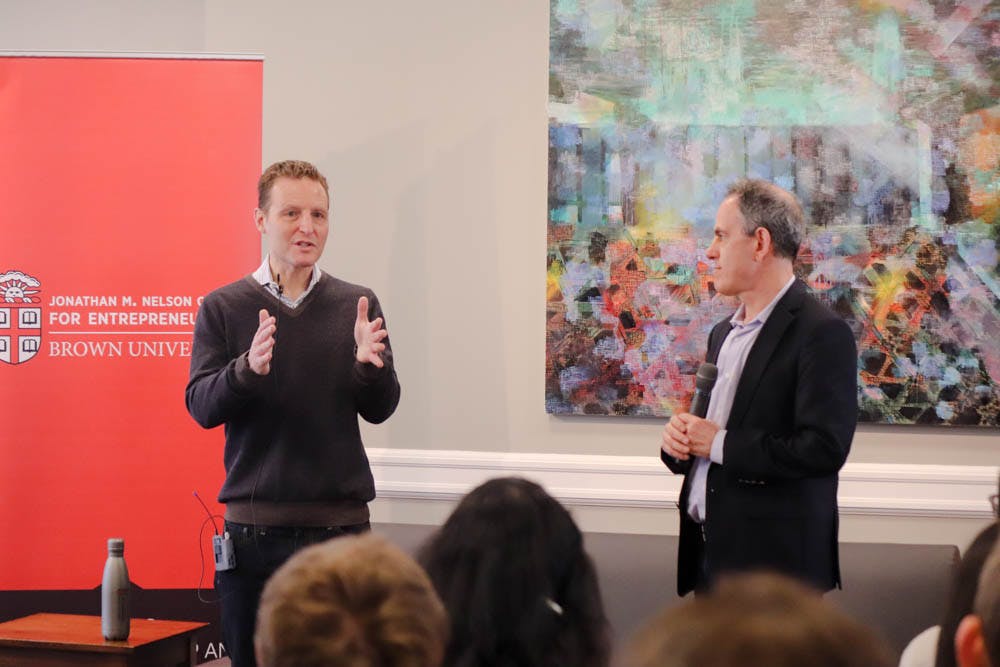For former CFO of Facebook David Ebersman ’91, the most important takeaway from his time at Brown was “the idea that learning was interesting for the sake of learning.” In a conversation on Wednesday with Danny Warshay ’87, executive director of the Nelson Center for Entrepreneurship, Ebersman spoke about how that takeaway influenced his career path that has spanned multiple fields, from technology to mental health care. He also touched on his journey to founding a mental health startup and the challenges within that field.
After leaving Facebook, Ebersman founded Lyra Health, a mental health startup that aims to “help people quickly (find) high-quality health care.”
One reason he decided to start Lyra was because he wanted to learn more about mental health. “As I was doing research and learning more about the challenges and opportunities in mental health care, I wanted to read more. … I really wanted to dive deeper and this was a sign that it’s a problem that would sustain me.” Ebersman described that he evaluates his passion for a subject based on if he wants to continue reading about and researching it.
Ebersman also found the large scope of the problem particularly compelling, since mental health issues affect 20 percent of American adults. Entering the field would give him the opportunity to help millions of people.
Even though Lyra has the potential to make a large impact, Ebersman outlined some of the challenges he faced going into the field of mental health. One such challenge is the stigma surrounding the use of mental health resources, which Lyra attempts to address.
“What we try to do is find language to talk about the issues that doesn’t feel judgmental.” For example, instead of using clinical terms such as “depression” and “anxiety,” Ebersman suggested using more commonplace terms such as “stress.”
Another challenge of the health care industry is its multifaceted and complicated structure, which requires many stakeholders, partners and experts to navigate, he said.
“The quality of care is quite variable in mental health. There isn’t some sort of overriding one way to approach these problems,” Ebersman said. He contrasted the lack of structure in mental health care with the structured process of drug development he had experienced while working at Genentech, a biotechnology company.
Ebersman worked at Genentech for 15 years before moving to Facebook, a journey he described as “filled with serendipity.” Ebersman lost his job following an acquisition of Genetech on the same day that Facebook let go of its CFO. The social media giant later asked Ebersman to take the role.
With previous professional experience in different fields, Ebersman emphasized the breadth of his skill set as compared to the depth of it. “I had four different jobs in 15 years, in different groups,” he said. Ebersman said working at Facebook gave him the courage and motivation to start Lyra. The ideology at Facebook that “if you apply enough good intent, software and data, you can solve any problem in the world,” encouraged Ebersman to use those tools to solve challenges in mental health.
In addition to the value of working across different industries, Ebersman also stressed the importance of working with different types of individuals. “Half of work is solving problems and the other half is getting along with the people you work with,” he said. At Facebook, Ebersman gained experience in large scale collaboration, since the company gained thousands of employees during his time as CFO.
Erica Jones ’21, a concentrator in cognitive, linguistic and psychological sciences who had previously studied the research, diagnosis and symptoms of various mental illnesses in class, was curious about how startups use technology to solve challenges in the mental health field.
Ebersman’s “broad background … opened my eyes to the power of collaboration between diverse people in industries and nonprofits to help society,” Jones said. “It encouraged me to not limit myself to careers and internships focused squarely on psychology.”
Nishanth Kumar ’21 said the talk taught him about how successful people may have nonlinear and diverse career paths but still share fundamental characteristics such as curiosity and hard work.





